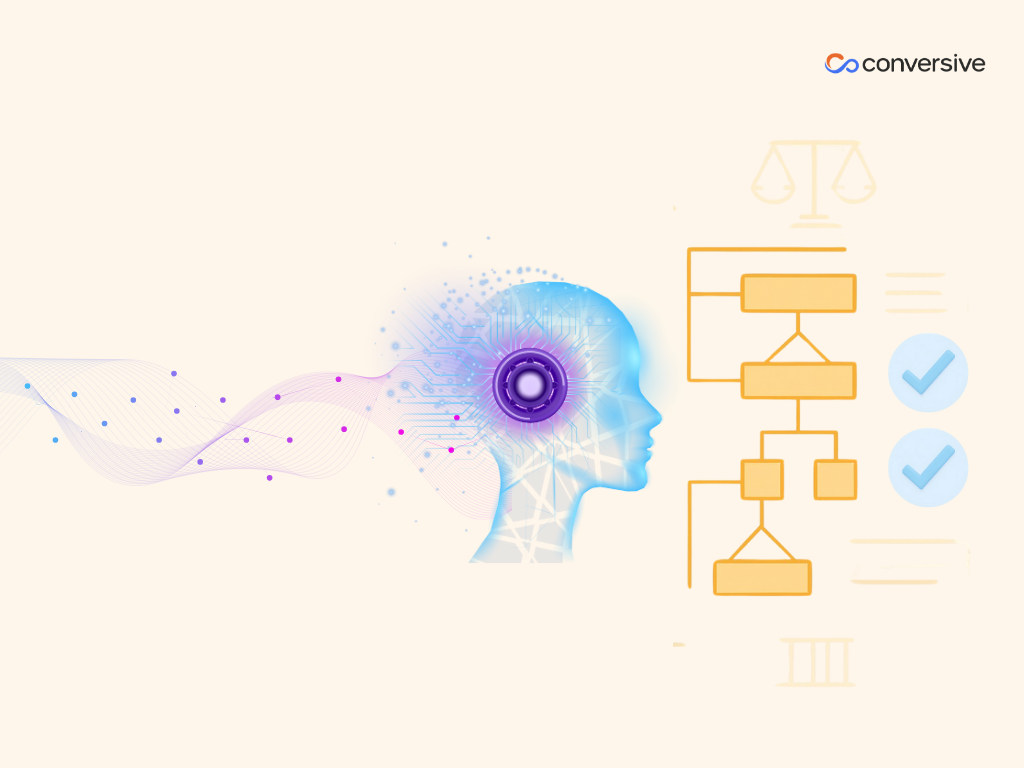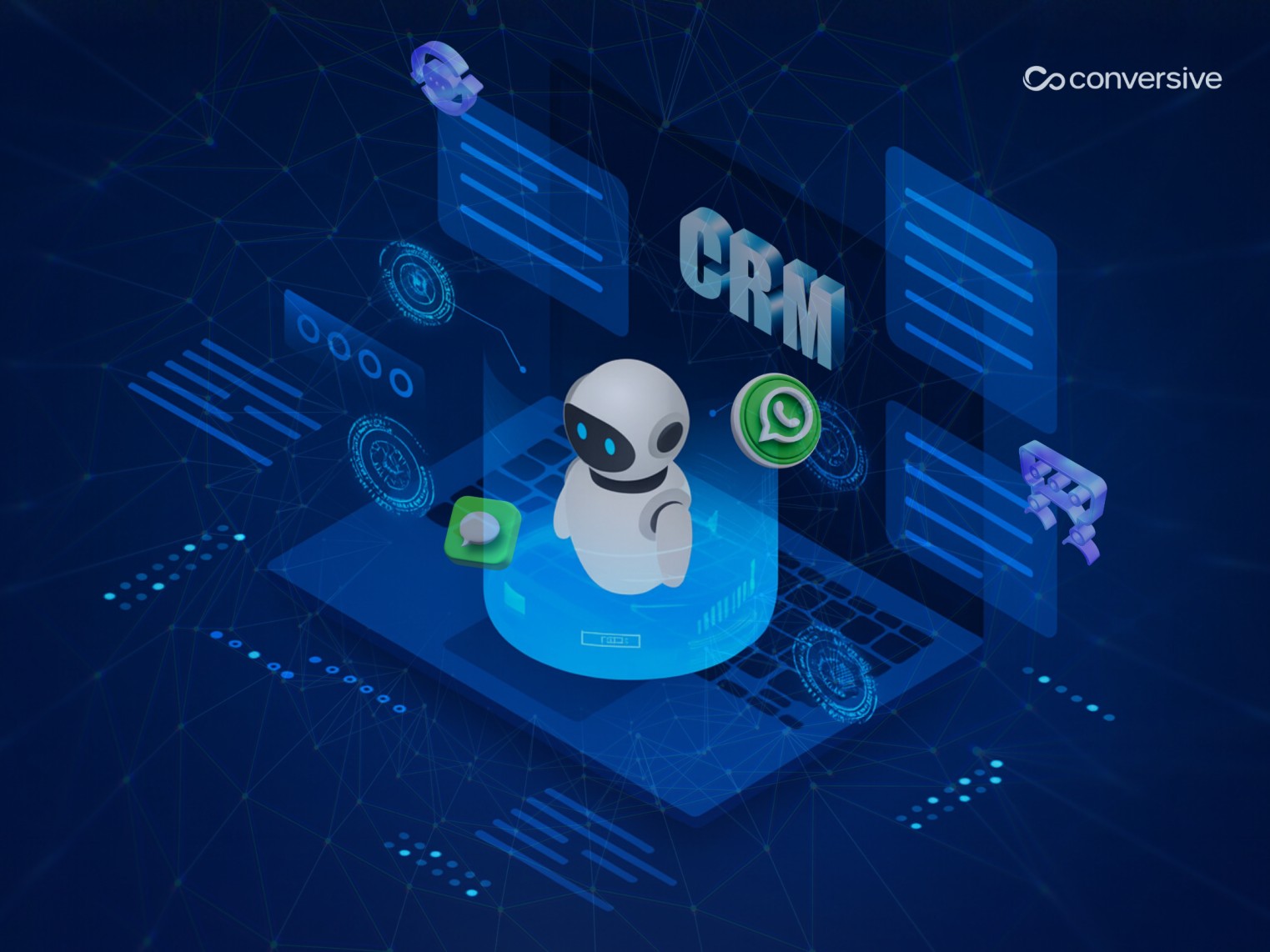%20(4).avif)
How AI Chatbot-CRM Integration Powers the Modern Sales Engine
Integrating AI chatbots with CRM transforms routine automation into intelligent, data-driven engagement. Conversive empowers businesses to connect, convert, and retain customers seamlessly.
Introduction
In recent years, AI chatbots have emerged as one of the most effective tools for enhancing customer interaction and experience. Industries such as healthcare, finance, e-commerce, and education have witnessed a significant surge in chatbot adoption, reflecting their growing importance across customer-facing functions.
This rising adoption of AI chatbots is attributed to cost efficiency, 24/7 availability, instant responsiveness, and the ability to handle high volumes of customer interactions at scale. They are capable of automating repetitive tasks while ensuring a seamless customer experience.
Referring to report, nearly 80% of marketing and sales leaders have implemented or plan to integrate chatbots into customer interactions.
Moreover, modern enterprises are seeing AI chatbots as more than digital assistant for initial interaction or basic query resolution. When implemented strategically, chatbots can drive customer acquisition, qualify and nurture leads, and even contribute directly to revenue generation.
However, to unlock their full potential, AI chatbots should be integrated with CRM system. Using customer data, AI Chatbots can operate with context and intelligence.
As a result, it would empower businesses to deliver personalized and data-driven experiences at every stage of the customer journey. Eventually, powering the modern sales engine.
CRM: The Catalyst for Transforming Chatbots into AI Agents
In today’s digital economy, data is the fuel driving business decisions. Every customer interaction generates valuable insights. These insights further guide proactive action and help brands stay ahead of the customer needs.
At the core of this ecosystem lies the CRM — a unified hub that brings together customer data from every department. It centralizes insights across marketing, sales, support, and digital interactions to deliver a true 360° customer view. With this unified intelligence, businesses can engage every customer as a unique individual.
For instance, in healthcare, data stored in the CRM enables clinics to proactively reach out to patients about their upcoming appointments or follow-ups. This not only enhances engagement but also improves patient satisfaction.
AI chatbots, when paired with CRM, bridge the gap between automation and personalization. It delivers meaningful proactive engagement with context, ensuring every communication feels human.
%20(1).avif)
The Upgrade: Turning AI Chatbots into AI Agents with CRM Data
The Evolution: From Chatbots to AI Chatbots
Traditional chatbots were rule-based systems designed to respond to predefined queries — efficient but limited. They could answer FAQs or follow simple workflows, but often failed to understand user intent, context, or emotion.
AI chatbots, on the other hand, represent a paradigm shift. Built on the foundation of machine learning and natural language processing (NLP) or Generative AI, they understand conversation context, analyze sentiment, and learn from every interaction. This intelligence transforms conversations from scripted exchanges into dynamic, human-like interactions.
What was once a tool for answering questions has evolved into an intelligent digital assistant— capable of engaging, qualifying, nurturing, and even predicting customer needs.
This leap from reactive to intelligent communication laid the foundation for a more strategic upgrade: AI Agent: AI Chatbot–CRM integration. AI agents are capable of:
- executing a sequence of actions autonomously
- delivering personalized conversations
- concluding an informed decision
- providing a relevant solution that is helpful
throughout the customer journey.
%20(2).avif)
The real power of AI Chatbots unfolds when they operate in sync with CRM systems. Together, they bridge the gap between automation and intelligence.
While the journey mapping shows the functional shift, the real impact is reflected in tangible impacts- operational efficiency, faster response times, and higher customer satisfaction.
From smarter data handling to predictive engagement, AI Chatbot–CRM integration redefines how businesses connect, convert, and retain customers in an experience-driven economy.
Key Advantages of AI Chatbot–CRM Integration
%20(3).avif)
These advantages set the stage for practical, high-impact applications — where AI Chatbot–CRM integration moves from theory to real-world results across industries and customer journeys.
Insight to Impact: Real-Time Use Cases of AI Chatbot–CRM Integration
When AI chatbots integrate seamlessly with CRM platforms like Salesforce, they don’t just automate interactions — they elevate the entire customer journey. Here’s how this synergy delivers measurable impact across industries:
1. Lead Generation and Qualification: Leads from multiple sources, such as website inquiries, QR codes, social platforms, WhatsApp, and email, are captured in CRM and instantly enriched with relevant data.
Here is a use case of an AI Agent in the education industry:
- Identify genuine student interest using behavioral indicators
- Auto-score leads based on eligibility criteria
- Ask qualifying questions dynamically
- Segment leads into Hot / Warm / Cold with real-time CRM updates
- Auto-assign to counsellors based on region, program, or availability
Result: no more unqualified leads passed to admission teams
2. Intelligent Query Routing to Human Agents:
AI Agents ensure every high-value inquiry reaches the right sales representative at the right time, with complete customer context for faster conversions.
For instance, in the mortgage industry, queries often move from simple interest checks to complex eligibility decisions. Conversive’s AI Agents automatically detect intent, urgency, and borrower profile. Further, it routes prospects to licensed mortgage advisors exactly when human expertise is required.
How It Works in Mortgage Sales
- Identifies conversation shift: From general exploration → high-intent purchasing signals.
- Delivers full CRM context with handoff: Advisor gets credit history insights, past interactions, and loan preferences. This leaves no repetitive questions.
3. 24/7 Customer Support and Case Management
AI Agents ensure customers receive uninterrupted support and timely resolution, even outside business hours.
By integrating AI chatbots with CRM, businesses can automate end-to-end case management. The AI Agent captures customer issues, creates service tickets, and provides instant responses from the knowledge base.
How it Works in Healthcare
- Automates high-volume patient queries: Handles common support queries anytime, anywhere. For example, appointment inquiries and test results follow-ups.
- Creates and updates service tickets automatically: Every patient interaction is logged and routed to the right medical staff.
- Seamless omnichannel experience: Ensures customers never repeat information, maintaining full visibility across channels.
These use cases have become business imperatives in an era where customer experience is the ultimate benchmark. Conversive stands at this intersection of automation and intelligence, enabling enterprises to build meaningful, data-driven conversations at scale.
As organizations look to implement Conversational AI, several factors determine how effectively AI chatbots integrate with CRM systems. Let’s explore what shapes a successful integration
Key Factors Shaping AI Chatbot–CRM Integration Success
Successful AI chatbot–CRM integration is about aligning intelligence, workflows, and data in a way that enhances every customer interaction. For organisations to realise the full potential of this synergy, a few foundational elements must be in place.
1. AI Capabilities and Use Cases:
The strength of the integration begins with the AI layer itself. The chatbot should be capable of contextual understanding, sentiment analysis, and intent recognition to deliver meaningful, human-like interactions.
Platforms like Conversive bring adaptive intelligence that allows businesses to customize use cases — from lead nurturing to automated case management — based on industry and workflow requirements.
2. Security and Data Privacy Compliance:
With sensitive customer data flowing between systems, adherence to global privacy standards like GDPR, HIPAA, and SOC 2 is non-negotiable.
3. Workflow and Automation Logic
A seamless integration depends on how well the AI chatbot aligns with existing CRM workflows. The system should support custom automation logic, dynamic routing, and rule-based triggers to fit organizational needs.
Conversive integrates effortlessly with tools like Salesforce, HubSpot, and likes of them – orchestrating workflows without disrupting existing operations.
4. Scalability and Maintenance:
As enterprises expand, the solution must scale across teams, regions, and communication channels. A well-integrated AI chatbot should support high concurrency, multi-language capabilities, and easy retraining through low-code configurations.
Conversive’s architecture enables continuous scalability while minimizing maintenance overhead.
In essence, effective AI chatbot–CRM integration is built on the foundation of intelligence, compliance, and adaptability. Conversive embodies these principles — ensuring businesses don’t just automate interactions, but elevate them into strategic customer experiences.
Conclusion:
In a world where every customer interaction counts, AI chatbot–CRM integration has become a strategic necessity — driving personalization, responsiveness, and business intelligence at scale. The future belongs to businesses that blend automation with empathy, transforming conversations into conversions.
Conversive is built for this future — a powerful conversational AI platform designed to integrate seamlessly with any CRM, delivering intelligent, human-like engagement across industries.
Experience how Conversive can redefine your customer interactions.Book a Demo


%20(4).avif)
.png)

